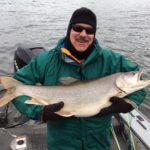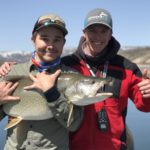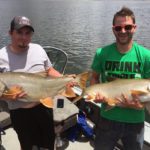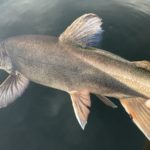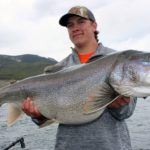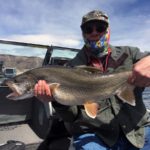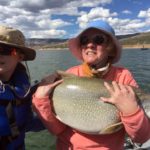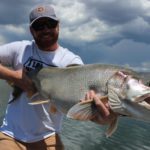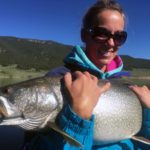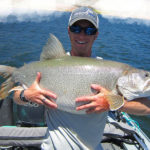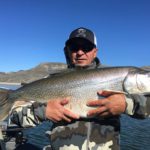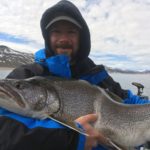Colorado Trophy Lake Trout-
Trophy lake trout live in several Colorado lakes and reservoirs. These fish grow a lot slower than most trout or char species, but can live to be 60 years old in the right conditions! The current state record came out of Blue Mesa reservoir in 2007 and weighed a whopping 50 lbs 5 ounces! These fish can only live to grow big and old if we do our part as anglers to release them in their younger years. We have seen several accounts of a single fish being caught 3-4 different times by 3-4 different anglers over a span of 15 years, all thanks to catch and release practices being implemented! Just like all species, not every lake trout has the genetics to grow old and big. That’s why it is so important to release the fish that are over 22″. Once a lake trout grows beyond this length, they typically have switched over to a fish diet and will have great odds of becoming a 30-40″+ fish.
Releasing big lake trout is an incredible gift that you can give to fellow anglers, future generations of anglers, and even yourself as an angler! That fish could be the “catch of lifetime” for several different people or even your own children one day. To ensure a proper release of a trophy fish, here are some things to keep in mind:
- Minimizing the amount of time these fish spend out of the water is crucial, especially when ice fishing. They typically put up a strong fight and are out of energy when landed. Getting them back promptly allows them to get oxygen in their gills and back into their bloodstream. When ice fishing, it also prevents their eyes and gill rakes from freezing.
- Their gills are very fragile. Be very conscientious of your hands not touching the gills when handling the fish and taking pictures.
- These fish spend 99.9% of their lives in a somewhat horizontal position. Holding them vertically can tear their gill area, pop their vertebrates, and cause other damage. Try to keep these fish as horizontal as possible and support their weight so that it doesn’t put an awkward strain on their back and body.
- Using techniques that often result in the fish swallowing the bait (gut-hooked) greatly reduces the odds of that fish recovering, even after release.
- Be sure to give the fish time to recuperate and get their bearings back before you attempt to let them swim off on their own. Sometimes this takes 10 mins or more depending on the fight.
- Sometimes lake trout caught in deeper water have a hard time burping air out of their air blatter during the fight and have a hard time swimming back down as a result. There are several ways to combat this, but the easiest is to invest in a laker-saver. Click the link to learn more!
- Following these best practices will give your fish the best chance at survival and being caught again years down the road!
The fish below have all been caught and released at least one if not two times by use, our friends, and our clients!

